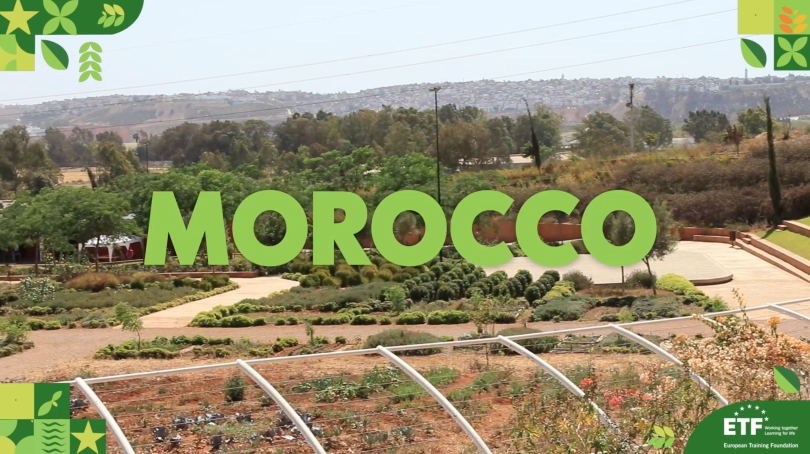
Green Skills Award 2023 finalist: Morocco with Spain - Bouregreg Med-O-Med Gardening School by FUNCI
Growing a greener future – Morocco’s first gardening school
The Bouregreg Med-O-Med Gardening School, on the outskirts of Salé, Morocco, is firmly rooted in sustainable principles.
Built near a rehabilitated old landfill site, the eight-hectare site features a raw earth building, photovoltaic solar-powered electricity, and teaches an entirely ecological gardening model that pays close attention to irrigation and water sources. An apprenticeship training centre, the school is officially accredited as a vocational training institution, and aims to promote green employment for young people at risk of social exclusion. It is supported by both European and Moroccan institutions. Its success makes it one of the 10 finalists of the European Training Foundation's Green Skills Award 2023.
Established in 2018, the project was conceived by FUNCI president, Cherif Abderrahman Jah; and is managed by FUNCI-Morocco, a non-profit cultural institution, which provides sustainability for work developed by the Islamic Culture Foundation.
The key aim of the project is to “contribute to reducing the youth unemployment rate in Morocco by creating job opportunities in the ecological and sustainable gardening sector,” says Inés Eléxpuru, Communications Director for FUNCI Morocco-Spain.
Youth unemployment is a major problem in Morocco. Although the unemployment rate has fallen from 12.8% to 11.2% and more than 133,000 new jobs have been created in the country over the past 18 months, nearly three-quarters of young people under 24 have never had a job, and 70.4% are long-term unemployed, according to the government statistical agency (Haut-Commissariat au Plan). Few of Morocco’s 5.9 million young people are able to participate in the working life of the country.
The three-year diplomas offered at the school – professional aptitude certificates, specialisation diplomas and qualification diplomas – are based on a curriculum and pedagogical approach developed and tested in Spain; the courses are adapted to Moroccan standards by Spain’s University of Seville and accredited by Moroccan authorities. The school trains up to 90 students annually. Entrance requirements for students aged between 16 and 25 are simply that they know how to read and write, are motivated and in economic need.
A range of measures support students in developing their skills and confidence to eventually find jobs. Designed to become partially self-financed in the medium term, the school involves students in income-generating activities, including garden services, letting out space and running awareness-raising workshops.
There are courses in transferable skills, run by Morocco’s national employment agency, ANAPEC, and modules in training for a career in nursery work in the school’s Plant Production Centre. During the summer break, paid internships are provided via a state integration project. Students have worked at public gardens in Marrakech, the Marriott Hotel in Fès, a cleaning company in Rabat and private residences, where they can put “innovative methods of ecological and regenerative gardening learned at the school” into practice, Inés says.
The school’s environmental record reflects its approach to sustainability: it offers a plants propagation/nursery that specialises in indigenous and endemic Moroccan species in order to adapt gardening models to current climatic circumstances. It is the first centre of its kind in Morocco and its sales support the school. The rehabilitation of the old landfill site was part of a landscape regeneration project that has prevented the emission of more than 250,000 tonnes of carbon into the atmosphere. At least a fifth of students are young women – an important factor in a professional training sector usually reserved for men.
There are regular seminars and conferences on ecological gardening and environmental awareness, and frequent school visits organised for young children. Permaculture and gardening courses for external and adult students are also put on.
Sales from the school nursery – which is to double in size to an hectare within two years – should soon generate EUR 30,000 annually.
The school has “become a reference in Morocco in terms of quality professional training, social integration, regenerative management of green spaces, and awareness of the environment,” Inés says.
Did you like this article? If you would like to be notified when new content like this is published, subscribe to receive our email alerts.